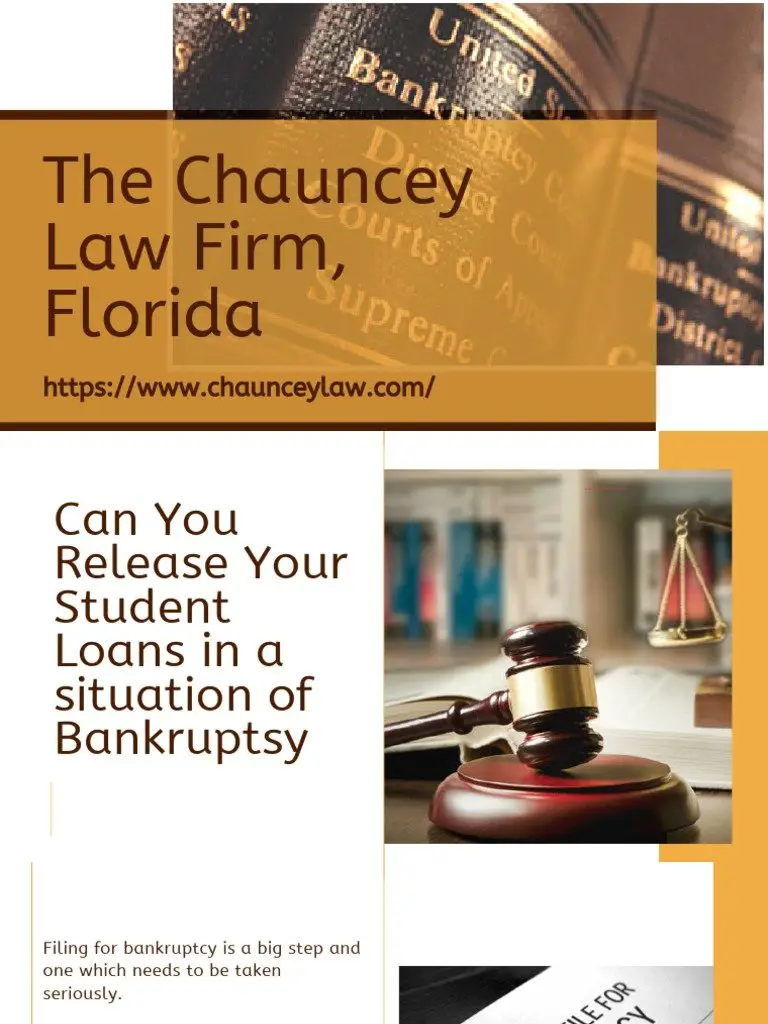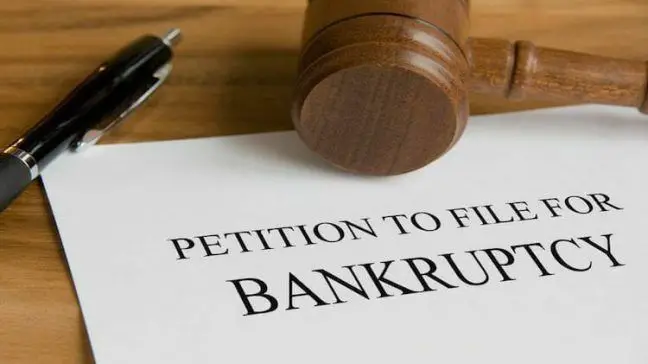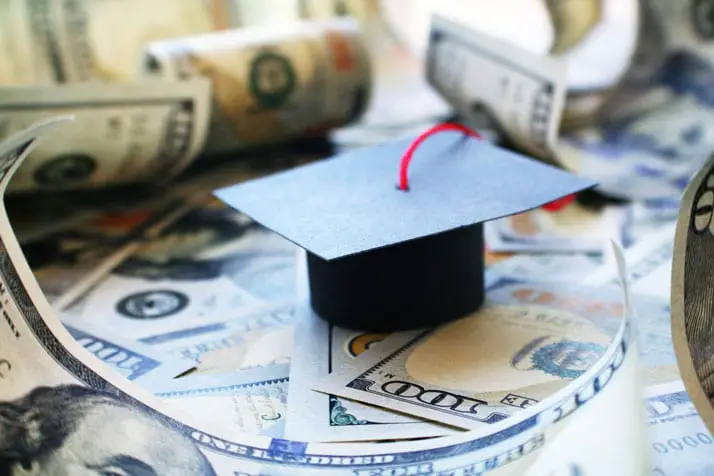What Other Resources Help With Student Loan Debt
If passed, the Student Borrowers Bankruptcy Relief Act of 2019 introduced in Congress last year may make an exception to the undue hardship rule and allow debtors to discharge their student loan debt more easily. Whether the bill will pass or how long it will take to go into effect remains to be seen.
If your finances are otherwise in good orderthat is, you have little debt outside of your student loan balancethere are many other ways to get help with student loan debt in the meantime without necessarily filing for bankruptcy.
When To File Student Loan Bankruptcy
There’s no set time to file student loan bankruptcy. You can file it before your bankruptcy case closes. Bankruptcy law also allows you to file it after the court closes your bankruptcy case.
From my perspective as a student loan lawyer, I recommend people should consider filing student loan bankruptcy when:
- they can no longer afford their private student loans and can’t afford a settlement
- they have a physical disability that limits their ability to work but does not qualify them for a total and permanent disability discharge
- they have defaulted a second time on a federal student loan and can’t get out of default
- they cannot get a professional license
- their elderly and have made a good faith effort to repay their student loans
If you decide you’re ready to file student loan bankruptcy after looking at your situation, the next step is to meet with a bankruptcy attorney to determine what bankruptcy you should file, Chapter 7 or Chapter 13.
What Are The Pros And Cons Of Student Loans
Student loan bankruptcy may be either a Chapter 7 or Chapter 13. On average, student loan debt makes up 43% of consumers debt. Another 24% of debt is uncategorized or unsecured. Unsecured debt comes from medical bills, credit card debts and personal loans, and mortgage.
In a Chapter 7, you are trying to get all unsecured debts discharged. That said, student loans may be so high that not all this debt goes away with a Chapter 7. So even if you win your petition, it may not change the fact you have debt. Even while it would lower the amount you owe.
In contrast, for a Chapter 13 you are trying to reorganize the debt into affordable payments. It could be a useful option if you have debts not eligible for relief. Also, your income level may disqualify you from declaring Chapter 7 bankruptcy. In this case, if you can afford to pay some of your debt, Chapter 13 may be your only option.
Don’t Miss: How Many Times Did Donald Trump File For Bankruptcy
Not All Loans To Students Are Treated As Student Loans Under Canadas Insolvency Laws
We know that there are special rules when we are dealing with student loans and that people with these debts receive harsher treatment than those with garden variety debts. It is, however, important to know that not all debts arising from loans made to students receive this harsher treatment. Some chartered banks in Canada might offer special loans to students attending a post-secondary education which do not fall within the definition of student loans. These loans might simply be garden variety bank loans which are marketed solely to students attending a post-secondary institution.
Bankruptcy And Financial Aid

This page answers common questions about the relationship between bankruptcy and financial aid, such as student loans. The first answer concerns the impact of bankruptcy on eligibility for student loans. The second answer discusses whether student loans can be discharged through bankruptcy.
Thanks to Pat Somers of the Univ. of Arkansas at Little Rock and Art Bilski of the Illinois Student Assistance Commission for their assistance with this section.
Bankruptcy and Eligibility for Financial Aid
Will a bankruptcy affect a students future eligibility for student loans and other financial aid?
The answer to this question is a complex one because several issues are involved. It depends on the nature of the student loan programs and the type of bankruptcy.
Whatever the circumstances behind the bankruptcy, the student should talk with the financial aid administrator at the school he plans to attend, and explain the situation. The financial aid administrator may be able to guide the student to certain loan programs or lenders that may fit his needs.
Generally speaking, a bankruptcy should have no impact on eligibility for federal student aid.
The anti-discrimination rules appear in 11 USC 525:
Discharging Student Loans Through Bankruptcy
- if the borrower files an undue hardship petition
Types of Bankruptcies
Read Also: How Many Times Did Donald Trump File For Bankruptcy
Is It Possible To File For Bankruptcy For Student Loans
The good news is it is possible to file for bankruptcy, if you are unable to pay back the student loan. However, as compared to other debts, declaring bankruptcy in the case of both federal and private student loans is more difficult.
You will need to prove in the court of law that you are facing, what the US Bankruptcy Code terms an undue hardship, in being compelled to repay your student loan. This makes the case complex and requires a bankruptcy attorney.
Can Student Loans Be Discharged In Bankruptcy
If you want your student loans and other debts discharged outright, youll need to file a Chapter 7 bankruptcy. But keep in mind theres no guarantee your student loans will be discharged unless certain other criteria are met. If you dont qualify to file Chapter 7, you may be able to restructure your student loan payments or have them discharged in a Chapter 13 bankruptcy. Once your Chapter 13 bankruptcy ends , youll be responsible for repaying your federal student loans if you werent able to prove undue hardship.
Recommended Reading: How Many Times Has Trump Filed Bankruptcy
Alternatives To Bankruptcy For Student Loans
Since bankruptcy can be an expensive and cumbersome process, most experts see it as a last resort for borrowers. Consider bankruptcy after youve exhausted all other options, like debt consolidation, credit counseling and negotiating with creditors for a lower payment or interest rate.
If youre balancing student loan payments with other expensive, dischargeable debts like credit cards and medical bills, then bankruptcy may be able to provide relief. But if student loans are your only concern, consider these alternatives.
Student Loans Are Tallied Separately
When you file for bankruptcy, your student loans are tallied separately for statistical purposes.
That means youve got to add them up on their own and account for them on the statistical summary.
Lawyers have software that does this automatically, by the way. It frees me up to think about bigger problems than whether Ive added numbers correctly.
Recommended Reading: Can Bankruptcy Stop A Judgement
Student Loan Bankruptcy: The Process
For many people, student debt is the one debt they can’t seem to overcome no matter what they do. They’ve made payments when their financial situation allowed. Asked for deferments and forbearances when they couldn’t. They’ve applied for loan forgiveness and lower interest rates. And they’ve even asked for options to reduce their outstanding student loan debt via settlement.
Nothing has worked thus far.
It’s at that point that filing student loan bankruptcy becomes an option.
When Can You File Student Loan Bankruptcy
Exactly when you can file a student loan adversary proceeding depends on what type of bankruptcy case you filed.
If you filed chapter 7 bankruptcy, you could file the lawsuit right away. You also can file it soon after you get a discharge. And in some places, you may be able to file a few years after your case closed.
With a chapter 13 bankruptcy filing, you may be able to file the lawsuit right after your repayment plan is confirmed. The better thing to do, in my opinion, is to wait until your case is about to end and then file the lawsuit. Waiting until then provides the bankruptcy court with more information about your financial situation and your ability to make your student loan payments going forward.
Read Also: Can You Get A Personal Loan After Bankruptcy
When Bankruptcy Doesnt Discharge Student Loans
Even if bankruptcy cannot discharge your student loans, it may still be the right option for you.
People struggling with student loan debt often have additional outstanding debts ranging from credit card debt to unpaid mortgages. Bankruptcy can discharge these other debts, freeing up more funds to pay down your student loans.
Still, its wise to avoid bankruptcy whenever possible. Consider student loan consolidation as a way to simplify education loans, and try using debt settlement to minimize other types of debt.
If you borrow money, you have a moral and legal obligation to pay that money back. Students and parents should take the time to do cost-benefit analysis and long-range planning before accepting student debt of any amount.
But remember that bankruptcy laws were written to give people a second chance. If your debt load is overwhelming and you dont see a reasonable way out, bankruptcy is a legitimate debt-relief option. Even if you dont meet the criteria for student loan discharge, it might be possible to discharge other debts, freeing up resources to allow you to pay the student loans.
7 Minute Read
Filing For Bankruptcy On Your Student Loans Is Hard To Do

In order to file bankruptcy on student loans, borrowers have to meet a multi-part test proving that they have no chance of ever being able to pay the debt back. They have to demonstrate that paying their student loans would cause them “undue hardship.”
“Congress didn’t define what it meant by ‘undue hardship,’ so it was left to the courts to decide,” says higher education expert . As such, courts use a common method called the Brunner Test to evaluate whether or not a borrower qualifies for student loan discharge through bankruptcy. Through the Brunner Test, a borrower must prove the following:
Recommended Reading: How Many Times Did Donald Trump File For Bankruptcy
How To File Bankruptcy With Student Loans
Before you can proceed with seeking the cancellation of any private student debt through discharge, you would first need to file for Chapter 7 or Chapter 13 bankruptcy. If youre considering this approach, youve likely fallen behind on payments and been unable to meet your financial obligations. Lenders and creditors might have already sought judgments or turned over accounts to debt collectors.
Once the bankruptcy proceedings begin, youll need to file for an adversary proceeding, which is similar to a lawsuit in other courts. As a plaintiff, you can seek certain kinds of debt relief, like relief from private student loans, through these adversary proceedings.
During this adversary proceeding, youll need to demonstrate that you meet the strict standards of the undue hardship provision. This is an essential step if you want the court to discharge your private student loan balance.
How Can You File Student Loan Bankruptcy
Filing student loan bankruptcy is straight-forward.
First, you file your bankruptcy case. Next, you file the lawsuit.
Here’s about those two steps:
They’re two separate fees.
When you hired your bankruptcy lawyer to file your case, they charged you to get rid of your dischargeable debt.
Under the Bankruptcy Code, your dischargeable debt includes credit card debt, medical bills, repossessions, evictions, etc.
Some debt, however, isn’t automatically eliminated when you get your bankruptcy discharge. Student loan debt is one of those types of debts. To get rid of it, you have to file a lawsuit. And because you have to file a lawsuit, your bankruptcy attorney has to do more work. And because they have to do more work, they’re going to charge you a separate fee.
Can you avoid paying the fee by filing the lawsuit yourself? Sure.
Should you? That’s for you to decide. If you chose to do it yourself, read this guide to filing student loan bankruptcy I put together.
You May Like: Has Mark Cuban Ever Filed For Bankruptcy
When To File Bankruptcy
Although bankruptcy brings many disadvantages, it can be an option in a few cases. For example, if you have already tried all other possible options to pay off the debt, you can file bankruptcy. First, you need to contact your lenders or loan servicing companies to check what you can do to repay the debt. Next, you should be aware of possible repayment, discharge, and forgiveness programs. Finally, if none of these programs work for you, bankruptcy can be the only solution.
Besides, in case your debt obligations are way more than your income, bankruptcy can be unavoidable.
Refinancing For Private Student Loans
Unfortunately, if you have private student debt, you cannot qualify for Income-driven repayment plans. So, instead of filing bankruptcy on student loans, you need to act fast and find a debt management strategy.
First, you should contact your lender and explain your challenges. Although the lenders have no obligation to help you, they might still appreciate your good faith.
Besides, it can be a good idea to refinance your student loans. Refinancing can help you get lower monthly payments if you find a loan with a lower interest rate. However, this option can also be hard to achieve because refinancing requires good credit performance. So, instead of waiting till you need bankruptcy, act fast and refinance as soon as you are in financial trouble.
Recommended Reading: Epiq Bankruptcy Solutions Llc Ditech
What Is Total And Permanent Disability Discharge & How Do I Qualify
Living with a chronic illness or serious injury is hard enough without having to worry about making payments on your student loans. Luckily, the federal government provides the option of canceling a student loan borrowerâs federal student loan debt if the borrower is too sick to work. If you become disabled due to illness or injury, you may be eligible for the Total and Permanent Disability discharge of your federal student loan debt.
Bankruptcy Questions Answered: Can I File For Bankruptcy On Student Loans
More and more individuals are finding it difficult to both support themselves and pay off the debt that helped them get an education. Thisfriction leads many to wonder about student loan debt in bankruptcy what are the guidelines, and is it even possible? At Bates and Hausen, LLC our Northeast OhioBankruptcy Attorneys can help you tackle this common concern.
Don’t Miss: Can You Rent An Apartment After Filing For Bankruptcy
The Undue Hardship Exception
To have your student loan discharged in bankruptcy, you must demonstrate that it would be an undue hardship for you to pay them. The test for determining undue hardship varies between courts. Also, many courts look at the undue hardship test as all or nothingeither you qualify to get the whole loan discharged, or you don’t. Other courts have discharged a portion of a debtor’s student loan.
Regardless of the test used, most courts are reluctant to discharge a student loan. However, if you have very low income or your loan is from a for-profit trade school, you might have a better chance.
Student Loan Discharge In Bankruptcy

It is possible to discharge student loans in bankruptcy although it is not easy. The procedure is that an adversary proceeding must be filed in the bankruptcy court to prove that the undue hardship standard has been met.
In addition to discharge for undue hardship, we file adversary cases to show that in many cases, private student loans are actually nothing more than consumer loans disguised as student loans. If we can show that the private loan is a non-qualified education loan, it is discharged like any other consumer debt such as a credit card. Various arguments exist such as the loan amounts were beyond the cost of attendance, for an ineligible institution or for an ineligible student. We teach this topic to other attorneys around the nation and while it is a relatively new argument, there is plenty of case law supportive of discharge. If you have an attorney tell you that a student loan can never be discharged in bankruptcy, that is the old and very outdated view, and frankly, you should see another attorney who actively practices in this area every day.
The procedure is as follows:
The well known Brunner standard is followed in Florida which requires that you show:
the debtor cannot maintain, based on current income and expenses, a “minimal” standard of living for the debtor and the debtor’s dependents
additional circumstances exist indicating that this state of affairs is likely to persist for a significant portion of the repayment period of the student loans and
You May Like: How To File For Bankruptcy In Iowa
How To Prove Undue Hardship
So far, we’ve covered how and when to file student loan bankruptcy.
Now, let’s talk about how to win.
To get a student loan discharge, you have to prove undue hardship.
To prove undue hardship in Kentucky, you have to pass the Brunner Test.
The Brunner Test three factors to determine undue hardship:
In my experience, winning a bankruptcy proceeding against the Department of Education is near impossible.
The federal government offers student loan payments based on your income. It’s hard to argue hardship when your monthly payments are near $0.
Private student loans don’t offer those same types of income-based monthly payments. Because of that, you usually have a better argument that paying your private student loan debt back is an undue hardship.
Stop Stressing.
Hey, Iââ¬â¢m Tate.
I’m a student loan lawyer that helps people like you with their federal and private student loans wherever they live.